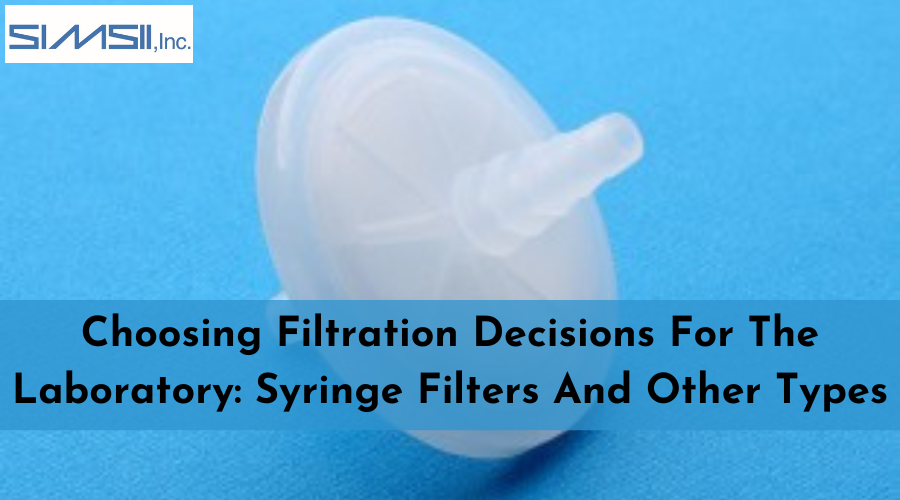
Filtration is essential in many laboratory procedures to remove impurities and unwanted particles from solutions. Choosing the right type of filter for your laboratory can be a daunting task as different types of filters are available, each with unique properties and applications. In this blog post, we will discuss syringe filters and other filters and guide you in selecting the most appropriate one for your lab.
Syringe Filters
Syringe filters are small, disposable filters attached to the end of a syringe to remove impurities and particles from a liquid sample. They are commonly used in sample preparation, analytical testing, and sterilization processes. Syringe filters are available in different materials and pore sizes to suit a wide range of applications.
PES Syringe Filters
Polyethersulfone (PES) syringe filters are commonly used in laboratory applications that require low protein binding, high flow rates, and high thermal stability. PES syringe filters are hydrophilic, making them suitable for filtering aqueous solutions. They have a broad chemical compatibility range and can be used in various solvents, including alcohols, acids, and bases. PES filters are available in pore sizes ranging from 0.1 to 5 microns.
Nylon Syringe Filters
Nylon syringe filters are commonly used for filtering aqueous and organic solutions and for sample preparation in HPLC and GC analysis. They are hydrophilic and have a broad chemical compatibility range, making them suitable for filtering a wide range of solvents. Nylon filters are available in pore sizes ranging from 0.1 to 5 microns.
PTFE Syringe Filters
Polytetrafluoroethylene (PTFE) syringe filters are commonly used in laboratory applications that require high chemical resistance and low protein binding. PTFE filters are hydrophobic, making them suitable for filtering organic solvents and aggressive chemicals. They have a broad chemical compatibility range and can be used in various solvents, including acids and bases. PTFE filters are available in pore sizes ranging from 0.1 to 5 microns.
Cellulose Acetate Syringe Filters
Cellulose acetate syringe filters are commonly used in laboratory applications that require low protein binding and high flow rates. Cellulose acetate filters are hydrophilic, making them suitable for filtering aqueous solutions. They have a broad chemical compatibility range and can be used in various solvents, including alcohols and esters. Cellulose acetate filters are available in pore sizes ranging from 0.1 to 5 microns.
Other Types of Filters
In addition to syringe filters, other types of filters can be used in laboratory applications, including:
Membrane Filters
Membrane filters are thin, porous sheets of cellulose acetate, nitrocellulose, or nylon. They are commonly used in microbiology, environmental monitoring, and air monitoring to trap bacteria, viruses, and other microorganisms. Membrane filters are available in pore sizes ranging from 0.1 to 10 microns.
Glass Fiber Filters
Glass fiber filters are made of fine glass fibers that are densely packed to create a porous material. They are commonly used in environmental monitoring and air monitoring to trap particulate matter. Glass fiber filters are available in pore sizes ranging from 0.7 to 12 microns.
Paper Filters
Paper filters are made of cellulose fibers and are commonly used in laboratory applications that require low cost and easy disposal. They are widely used in the filtration of aqueous solutions and can be used in gravity filtration setups.
Conclusion
In conclusion, selecting the appropriate filter for your laboratory depends on your experiment's specific application and requirements. Syringe filters are commonly used for sample preparation, analytical testing, and sterilization processes and are available in various materials, sizes, and pore sizes to suit a wide range of applications. PES syringe filter is suitable for low protein binding, high flow rates, and high thermal stability applications, while nylon syringe filters are suitable for filtering a wide range of solvents. PTFE syringe filters are ideal for filtering organic solvents and aggressive chemicals, and cellulose acetate syringe filters are convenient for filtering aqueous solutions. In addition to syringe filters, other types of filters, such as membrane filters, glass fiber filters, and paper filters, can be used for different laboratory applications. By understanding the properties and applications of various filters, you can choose the most appropriate filter for your laboratory needs.


